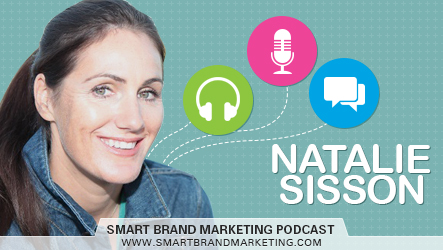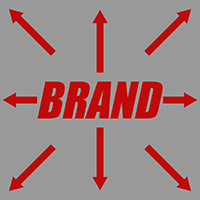Podcast: Play in new window | Download | Embed
Today’s Guest

Welcome to the 5th episode of Smart Brand Marketing with Tom Libelt.
My guest this week is Natalie Sisson. She is also known as The Suitcase Entrepreneur. We chat about how someone can start from nothing and build up a personal brand online.
Building Your Own Brand Online from Absolutely Nothing
Venturing into a new market can be quite hard regardless of how experienced you are running your own businesses. When it comes to the online world, there is a chance that you will have to start everything from scratch.
Fortunately for you, the process of starting your own venturing online is, for the lack of a better word, more convenient than the usual brick-and-mortar fare. However, the challenges here are quite different that it’s best that you tackle them properly. One such aspect is branding and never has there been a mistake greater in the online world than underestimating the power of a brand.
What Branding Does For You
Let’s get this out of the way. In as much as branding is important to your business, you don’t actually have much control over it. This is because branding is simply the way people perceive and treat your brand in the market.
This means that the best that you can do in branding is “influence” outside factors to improve your business’s social image. Regardless of how you do this (which we’ll discuss later on, don’t worry), the benefits of having a strong brand can be considerable. Here are some of them:
- 1. Recognition
 This one’s easy and readily observed. When you have a brand, you allow your audience a quick way to remember you. Here’s an example of how it works: whenever you see two golden arches that form an M, you immediately think of “McDonalds” even if said arches were not advertising you anything related to McDonalds. Or how about when you hear of the Playstation 2 bootup theme, you immediately think of Sony’s most popular gaming console of the 2000s?That’s how brand recognition works. You don’t have to be blatant with your advertising if you want your customers to recognize your business. All it takes is the right kind of stimuli and easy to remember cues to come up with something that people can recognize within an instant.
This one’s easy and readily observed. When you have a brand, you allow your audience a quick way to remember you. Here’s an example of how it works: whenever you see two golden arches that form an M, you immediately think of “McDonalds” even if said arches were not advertising you anything related to McDonalds. Or how about when you hear of the Playstation 2 bootup theme, you immediately think of Sony’s most popular gaming console of the 2000s?That’s how brand recognition works. You don’t have to be blatant with your advertising if you want your customers to recognize your business. All it takes is the right kind of stimuli and easy to remember cues to come up with something that people can recognize within an instant. - 2. Standing Out
 Here’s the thing: maintaining a competitive edge can be difficult in any market especially if you offer something that is similar to what every other business is offering. This is where branding comes in and it helps your business’s offerings stand out from the competition.For instance, if you offer, say, craft beer products in the local market, how do you make this one stand out from what other craft beer makers are offering? This is where your brand comes in and, if you do it right, you might just make your products all the more distinct from what other businesses are offering.
Here’s the thing: maintaining a competitive edge can be difficult in any market especially if you offer something that is similar to what every other business is offering. This is where branding comes in and it helps your business’s offerings stand out from the competition.For instance, if you offer, say, craft beer products in the local market, how do you make this one stand out from what other craft beer makers are offering? This is where your brand comes in and, if you do it right, you might just make your products all the more distinct from what other businesses are offering.
You might be the only craft beer maker that uses this certain combination of ingredients or your packaging might be unique than what everybody else has. Anything that can make your products distinct will really help here.
- 3. Introducing New Things
 When you have already established your business online, you might be compelled to introduce something new to your customers. However, this poses a challenge: how are you going to build up hype for your new offerings? With branding, people should hesitate less whenever you introduce changes in your lineup and might even expect for you to come up with something new on a regular basis.In relation to this, you can find that branding can help your business quickly recover from failed products. Look at Apple and Microsoft, there have been countless times when they introduce a new product, software patch, or new feature that people did not receive as well as the execs could have hoped for. Did the overall brand image suffer? No. That’s because they already established some standard of quality years before. This is why Apple and Microsoft can afford to have a few duds here and there and other companies can’t.
When you have already established your business online, you might be compelled to introduce something new to your customers. However, this poses a challenge: how are you going to build up hype for your new offerings? With branding, people should hesitate less whenever you introduce changes in your lineup and might even expect for you to come up with something new on a regular basis.In relation to this, you can find that branding can help your business quickly recover from failed products. Look at Apple and Microsoft, there have been countless times when they introduce a new product, software patch, or new feature that people did not receive as well as the execs could have hoped for. Did the overall brand image suffer? No. That’s because they already established some standard of quality years before. This is why Apple and Microsoft can afford to have a few duds here and there and other companies can’t.
Busting Some Branding Myths
Branding is an effective marketing tool in itself but it can also be easily misunderstood. This is why some myths about branding have popped and its best that these get debunked as soon as possible.
- 1. I Have a Logo, Therefore I Have a Brand
 A logo is just a representation of your ownership over the business. It’s simply this mark that identifies that business with you. True, some brands became successful by their logo alone but this is more of the exception than the norm. Branding is about how the rest of the market treats or regards your business as a whole. It’s the sum of all your values, strategies, culture, and vision; amongst others.For example, McDonalds is not just popular because of it’s M logo nor is Starbucks popular just because you can find one in every corner of a city. There are people, products, and an entire portfolio of strategies to back that logo up.
A logo is just a representation of your ownership over the business. It’s simply this mark that identifies that business with you. True, some brands became successful by their logo alone but this is more of the exception than the norm. Branding is about how the rest of the market treats or regards your business as a whole. It’s the sum of all your values, strategies, culture, and vision; amongst others.For example, McDonalds is not just popular because of it’s M logo nor is Starbucks popular just because you can find one in every corner of a city. There are people, products, and an entire portfolio of strategies to back that logo up. - 2. It’s All Feels, No SubstanceFor some reason, people think that branding is this emotionally-charged, whimsical thing that doesn’t work well with facts-driven companies and services. There is some truth about branding focusing on the more emotional aspects because the goal here, after all, is to connect with people.However, that does not mean that branding should force you to adopt this rather emotional mentality for your business because there are certain companies that don’t do well with being too emotional. Instead, what branding does is give your company a certain sense of humanity by giving audiences a peek into how the people behind the business think, feel, and perceive the world around them. Whether it is introducing your advocacies or giving a glimpse as to your company’s philosophies and vision, branding is there to help remind your audience that your business has people, too.
- 3. This is for Consumer Products Only
 This might be true; if we’re still in the year 2000. Today, branding is something that is something that service providers can also find value in but also a necessity. In fact, if you don’t offer something that is tangible i.e. a product, then you must project an image that the rest of the world can relate to and trust with their money.
This might be true; if we’re still in the year 2000. Today, branding is something that is something that service providers can also find value in but also a necessity. In fact, if you don’t offer something that is tangible i.e. a product, then you must project an image that the rest of the world can relate to and trust with their money. - 4. All I Need is to Be Cheap
 This myth is based on the notion that you can make the fact that you’re the cheapest provider of that product/service an identifying mark for the brand. This might be true for smaller-scale businesses but it does not always work and, for most of the time, it’s considered to be in poor taste.Look, emphasizing the fact that your business is cheap is going to work only for demographics that are extremely strapped on cash. As for the rest of the market, you’d be surprised as to how much people out there don’t give a damn how much they will pay for your products and services only that you could be trusted enough with whatever money they are willing to part with. In other words, make being cheap as part of your brand as much as you can but make it a point to offer some other quality that does not have to do with a price tag.
This myth is based on the notion that you can make the fact that you’re the cheapest provider of that product/service an identifying mark for the brand. This might be true for smaller-scale businesses but it does not always work and, for most of the time, it’s considered to be in poor taste.Look, emphasizing the fact that your business is cheap is going to work only for demographics that are extremely strapped on cash. As for the rest of the market, you’d be surprised as to how much people out there don’t give a damn how much they will pay for your products and services only that you could be trusted enough with whatever money they are willing to part with. In other words, make being cheap as part of your brand as much as you can but make it a point to offer some other quality that does not have to do with a price tag.
How to Do Branding the Right Way
First thing first, branding is not about you. It’s not about who you are, what you went through, and what you like. Instead, it should be what you can do for other people, the needs that you can address, and where your offerings can stand out from the competition.
As such, when planning for your brand, there are a few tips that you should keep in mind. Here are some of them:
- 1. Find an Opportunity
 Whenever you are branding your business, never go for the artists’ route. What that means is making a brand out of your passions. Don’t get the wrong idea, though. Passion is necessary for you to succeed in your business but, when it comes to connecting with other people, it’s not exactly the stickiest adhesive to wrap your brand around it.Instead of what you like, find out what other people need. Take the time to research what people in your area are trying to achieve or, better yet, what problems they encounter on a regular basis.
Whenever you are branding your business, never go for the artists’ route. What that means is making a brand out of your passions. Don’t get the wrong idea, though. Passion is necessary for you to succeed in your business but, when it comes to connecting with other people, it’s not exactly the stickiest adhesive to wrap your brand around it.Instead of what you like, find out what other people need. Take the time to research what people in your area are trying to achieve or, better yet, what problems they encounter on a regular basis.
Now, compare these needs with your skills and expertise and find out how you could best address those concerns. Also, take the time to study long-established brands in the market from where they succeeded and what areas they have yet to tap into. Perhaps you might offer something that will make your brand stand out more once you start your venture.
- 2. Define Your Focus
 Here’s one lesson you should learn quickly in business: you can’t be everything to every person in the market. This is true especially if you are just starting out as your main goal at that phase is to establish a foothold in the market and the mass appeal approach leaves you at risk of spreading yourself too thinly.Instead, try to find what area of the market you should focus on and let that dictate how the other parts of your brand are going to set up.
Here’s one lesson you should learn quickly in business: you can’t be everything to every person in the market. This is true especially if you are just starting out as your main goal at that phase is to establish a foothold in the market and the mass appeal approach leaves you at risk of spreading yourself too thinly.Instead, try to find what area of the market you should focus on and let that dictate how the other parts of your brand are going to set up.
To do this properly, you have to identify your target market and your value proposition to them. Aside from this, you should also identify what makes your brand different from the competition.
So, basically, your statement should go something like this:
“We offer (Insert your product and service here) for (Insert your target market here) to (Insert the value proposition here). Unlike (Insert competitors here), we (Insert your key differentiating quality here).”
- 3. Mind the Description
 Think of your brand as this living, breathing person. What would they be like? What would you use to describe them? The kind of words that you use for your branding will actually influence what people think about your business as a whole.Here’s a branding exercise for you: pick up your dictionary and look for 5 adjectives there that resonate the most with your brand. You might come up with things like “Sophisticated”, “Bold”, Quirky”, “Fun”, and “Trendy”, and so on and so forth.
Think of your brand as this living, breathing person. What would they be like? What would you use to describe them? The kind of words that you use for your branding will actually influence what people think about your business as a whole.Here’s a branding exercise for you: pick up your dictionary and look for 5 adjectives there that resonate the most with your brand. You might come up with things like “Sophisticated”, “Bold”, Quirky”, “Fun”, and “Trendy”, and so on and so forth.
Also, if possible, lay off the superlatives. Things like state of the art, cutting edge, world class, and top of the line tend to too much hype for your brand, hype that you might never reach. Look at Kanye West, for example. He’s always hyping himself up with ridiculous claims and managed to keep afloat for years. The question is what other people out there aside from Kanye that Kanye’d their way to success? Exactly.
As such, it would be best that you stick to adjectives that allow you to connect with people, not hype you up as the next best thing since slice bread.
- 4. Don’t Force It
 Again, it’s important to remember that how the market truly treats your brand is beyond your control. There’s nothing that you can do about it aside from saying the right words and offering the right offers to make people think better of you.As such, do not even attempt to force a certain brand into the market. You can’t dictate how people remember your brand or what they do with it. If you do force things into the market, they may grow to resent you or mock every strategy you will come up with.
Again, it’s important to remember that how the market truly treats your brand is beyond your control. There’s nothing that you can do about it aside from saying the right words and offering the right offers to make people think better of you.As such, do not even attempt to force a certain brand into the market. You can’t dictate how people remember your brand or what they do with it. If you do force things into the market, they may grow to resent you or mock every strategy you will come up with.
For an example, look no further than the videogame publisher/developer Ubisoft. These guys just can’t get a break in trying to establish a brand for the company since, well, most of their attempts are half-assed. From abusing the word “iconic” for mundane things like watches and baseball caps to cringe worthy presentations in events like E3 for years on end, the company has yet to really define its own proper band and, given that they have yet to learn from their mishaps, it would take another several years for them to get things right. Hopefully.
The point here is that all that you should do is provide the right cues and stimuli that will tell the audience what your business is and what it stand for. Do it right and your brand will naturally grow and become this sustainable asset for your business on a long-term basis.
Have you tried building a brand from scratch? What other tactics have you used for branding your business? Let us know in the comments below!
References:
https://thornleyfallis.com/5-myths-branding/
https://www.entrepreneur.com/article/298513
https://www.shopify.com/blog/how-to-build-a-brand
RESOURCES
- Natalie Sisson – Facebook
- Twitter: @NatalieSisson
THANK YOU FOR LISTENING!
To get more SBM content sent directly to your device as they become available, you can subscribe on iTunes or Stitcher!
Also, reviews on iTunes are extremely helpful and greatly appreciated! I read each and every one of them, and feel free to share your URL there so I can contact you later on and say thanks!
If you enjoyed this episode you may also love listening to:
Peter Shankman on Being Nice and Getting Publicity The Easy Way
Life of a Consultant and What it Takes to Create a Successful Podcast with Tim Conley


